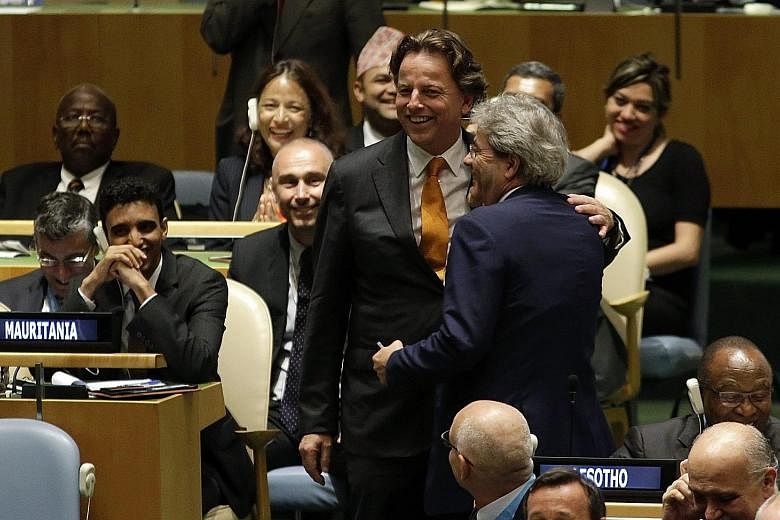NEW YORK • Italy and the Netherlands have agreed to split their term on the United Nations (UN) Security Council after a tie in voting forced them to reach a compromise.
In the vote for five non-permanent seats, Kazakhstan was elected for the first time, joining Bolivia, Ethiopia and Sweden in winning spots during the secret balloting at the 193-nation General Assembly.
But five rounds of voting ended with the Netherlands and Italy neck and neck at 95 votes each, far short of the two-thirds majority needed to win the seat.
Announcing the compromise deal on Tuesday, Dutch Foreign Minister Bert Koenders told UN delegates that the outcome was "a clear signal that you appreciate both our countries".
Italian Foreign Minister Paolo Gentiloni said that given the "perfect parity", the shared term on the council was a "way to show from two European countries a message of unity".
Under the agreement which will be put to a vote, Italy will serve on the council next year, and the Netherlands will follow in 2018.
Italy had lobbied fiercely for a council seat, portraying itself as a crossroads country in the Mediterranean and touting its experience in dealing with the refugee crisis. The European country is also seen as a player in efforts to pull Libya out of chaos.
The Netherlands, home to the International Criminal Court and other world tribunals, played up its commitment to international justice.
If approved by the assembly, the split term would be a rare but not unprecedented occurrence in UN history. Turkey and Poland set a precedent when they shared a Security Council term in 1960.
Western European envoys are to meet today to endorse the deal, which would then be put to a vote in the General Assembly.
Kazakhstan beat Thailand in a second round of balloting, picking up 138 votes against Thailand's 55 and winning the seat reserved for Asia. Kazakh Foreign Minister Erlan Idrissov said "we are very proud to be the first Central Asian country to serve on the council" and pledged to focus on nuclear non-proliferation and development.
Italy, the Netherlands and Sweden were vying for two seats meant for western Europe. Among the world's top aid donors, Sweden garnered 134 votes, scoring an outright win.
Running unopposed as the candidate from Africa, Ethiopia picked up 185 votes.
Bolivia, which had the backing of Latin American and Caribbean countries, won 183 votes.
The newly elected countries will take their place alongside the five permanent council members - Britain, France, China, Russia and the United States. The other five non- permanent members are Egypt, Japan, Senegal, Ukraine and Uruguay.
The new members will begin their stint on Jan 1, just as the next secretary-general takes the helm following an October election to replace Mr Ban Ki Moon. As the most powerful body of the UN, the Security Council can impose sanctions, endorse peace accords and authorise the use of military force.
AGENCE FRANCE-PRESSE

